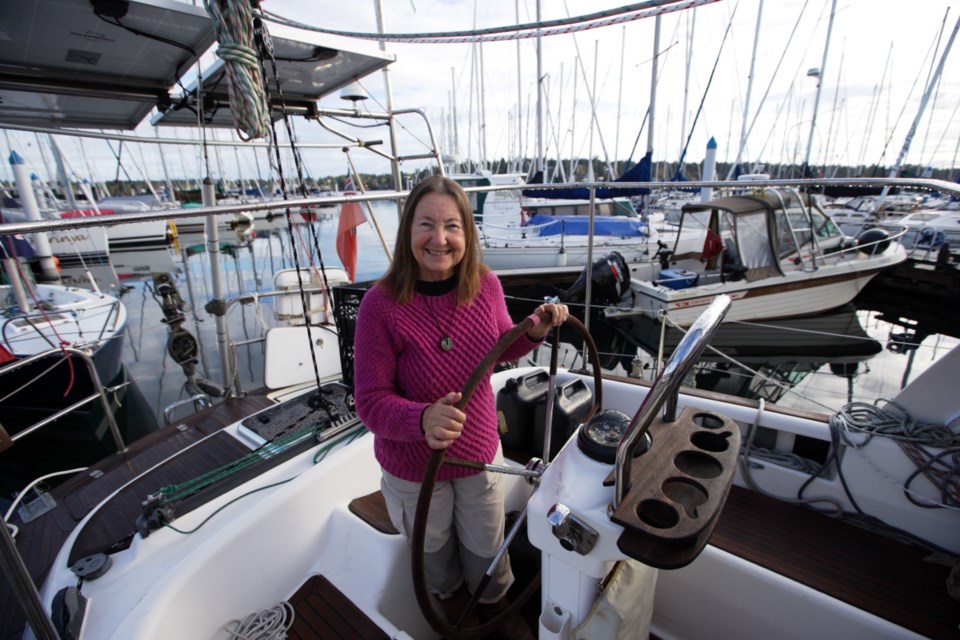Jeanne Socrates has sailed enough ocean miles, 160,000, to circumnavigate the world seven times. Now she wants to establish a new record.
Socrates has already been recognized by Guinness World Records and nautical associations, like the Cruising Club of America, as the oldest woman to circumnavigate the globe in a non-stop, solo, unassisted sailing trip. She completed the trip in 2013, Victoria to Victoria in 258 days.
On Oct. 17, the 74-year-old English woman will leave Ogden Point again to complete another circumnavigation. But this time she wants to become the oldest person to sail around the world, solo, non-stop and unassisted.
The record is held by yachtsman Minoru Saito of Japan, who completed a successful sail around the globe in June, 2005 at the age of 71, according to his website.
“If I had waited just one year to do the last one I would have been the oldest person and not just the oldest woman,” said Socrates in an interview at the Royal Victoria Yacht Club.
She was not born on the water or raised as the offspring of a sailing family. She was a mathematics professor at a university in London, England, where she has three grandkids from a son and a daughter. “And they don’t really understand what I’m doing.”
In 1997, Socrates and her husband, George, attended a boat show and bought their first sailboat. They had both been taking ocean sailing lessons for a few years. That boat purchase matched up with early retirements for both of them that year.
“We suddenly realized it was going to happen,” she said. “We were both very happy to just get out, get on the boat and get away.”
The Socrates spent many happy days sailing. They continued even after 2001, when George was diagnosed with terminal cancer. They were sailing off the coast of Venezuela in 2002 where George put ashore for a final bout of radiation treatment.
“He was able to stay on the boat for a good long time,” said Socrates. “Otherwise he would have just been kicking his heels back in London.”
After the final radiation, the couple left the boat and flew back to London for Christmas. George died in March 2003 at age 65.
Jeanne picked up the sailboat and continued sailing. She purchased another sailboat, a 38-foot Najad 380 named Nereida. It’s a vessel she mostly calls home. She has a house in London that she rents out to pay for her sailing expenses.
This latest attempt at circumnavigation is her fourth. Two of her earlier attempts were unsuccessful.
To meet the criteria for a genuine solo, non-stop. unassisted trip Socrates must sail down the coast of the U.S. and the length of South America. Going through the Panama Canal would count as touching land, something not allowed. So she must sail round Cape Horn at the southernmost point of the South America.
Cape Horn is a famously dangerous piece of sailing territory and one where a big wave knocked over her first boat on an earlier attempts at circumnavigation.
Socrates said she was lucky on that trip because her engine remained workable. The engine was sealed off to ensure the “unassisted” part of sailing. But after the mishap, she broke the seals and engaged it to make for shore.
Under normal conditions, running the engine is permitted only to charge batteries. Socrates will mostly rely on solar panels and wind generators to keep the power up.
After Cape Horn she will sail on for the southern tip of Africa before heading towards the Tasmania, Australia, northwards to New Zealand and back to Victoria. She will avoid areas close to Indonesia and certain parts of the African coast where piracy is a problem.
Throughout the trip, Socrates must not have anybody on board to maintain the solo aspect of the trip.
All food provisions must be taken on board at the start. She normally takes on year’s worth. Fresh water will be carried and rainwater collectors and desalinators are common on ocean yachts.
Her boat will carry a black-box style recorder, taking note of her positions via satellite signals for later verification.
“It’s not so much non-stop as not setting foot on land or even trying to land,” said Socrates.
After she passes the California coast, she doubts she will even catch sight of any other boats. She will be alone on board the boat for the remainder of the trip.
But she will talk on the radio every day and has friends the world over whom she has met only via radio. She will have plenty of chore — cooking, cleaning and making minor repairs.
Socrates is confident in her abilities to fix things if they go wrong. “I’m a logical person so anything that happens in the boat and I can see what’s gong wrong there is a good chance I can repair it.”
rwatts-@timescolonist.com



